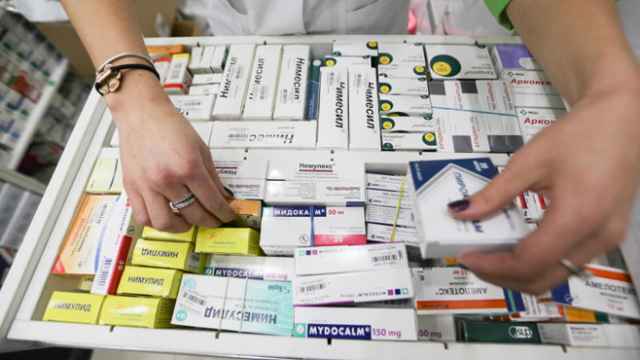Hungarian drug maker Richter expects revenue growth in its main market Russia to remain sluggish in ruble terms for the next few years, Chief Executive Erik Bogsch said in an interview on Tuesday.
Richter, which makes gynecological, cardiovascular and central nervous system drugs, has struggled this year because ruble weakness has cut the value of its exports to Russia. The company reduced its 2014 operating profit margin guidance last week due to falls in the ruble.
"In the Russian market, stagnation or minimal growth in ruble terms look realistic for the coming years," Bogsch said, referring to Richter's revenues.
"If the Russian economy stagnates next year, there is still chance for a minimal growth in medicine consumption."
Russia's currency has come under pressure partly due to sanctions imposed on the country for its role in the Ukraine crisis.
Richter, a major regional player with market capitalization of $2.9 billion, is expanding its business into western Europe, Latin America and China to mitigate the impact of the crisis on its eastern operations, which include Ukraine and Poland.
In the United States, Bogsch said approval by health regulators of a new anti-psychotic medicine, developed with U.S. partner Forest Laboratories Inc, could generate a milestone payment to Richter next year.
If approved, Cariprazine, designed to treat schizophrenia and bipolar disorder, could hit the U.S. market at the end of next year, Bogsch said, adding that the European application process could start in early 2016.
Richter expects 2014 revenue to fall by 5-6 percent from last year's 1.2 billion euros. In terms of revenues, the size of its Russian market has shrunk to 24 percent in the first nine months from 28 percent in the same period a year earlier.
Richter's shares dropped by 0.05 percent over the past three months according to Thomson Reuters data, underperforming the Budapest blue chip index, which gained 2 percent over that period.
A Message from The Moscow Times:
Dear readers,
We are facing unprecedented challenges. Russia's Prosecutor General's Office has designated The Moscow Times as an "undesirable" organization, criminalizing our work and putting our staff at risk of prosecution. This follows our earlier unjust labeling as a "foreign agent."
These actions are direct attempts to silence independent journalism in Russia. The authorities claim our work "discredits the decisions of the Russian leadership." We see things differently: we strive to provide accurate, unbiased reporting on Russia.
We, the journalists of The Moscow Times, refuse to be silenced. But to continue our work, we need your help.
Your support, no matter how small, makes a world of difference. If you can, please support us monthly starting from just $2. It's quick to set up, and every contribution makes a significant impact.
By supporting The Moscow Times, you're defending open, independent journalism in the face of repression. Thank you for standing with us.
Remind me later.






